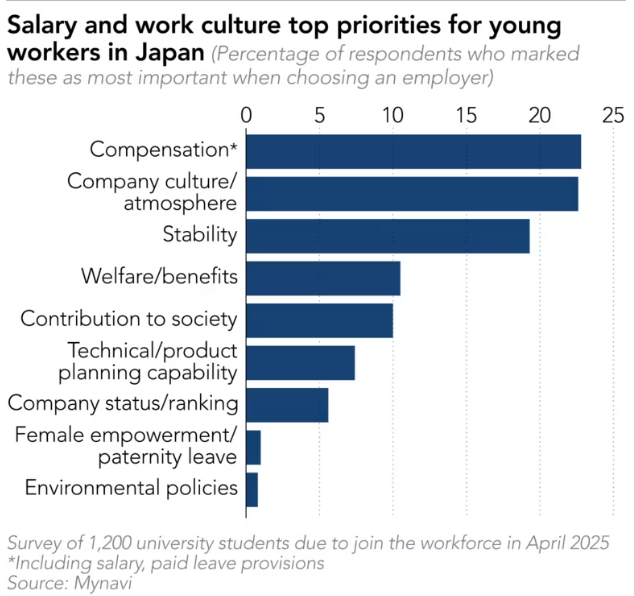Labor shortage in Japan and what that means for you Part 2: WLB in, ブラック企業 out
A recent survey by Mynavi of 1,200 university students entering the workforce in April 2025 reveals a clear generational shift in workplace expectations. The top priority for these young job seekers is compensation, including salary and paid leave, cited by 22% of respondents. Close behind are company culture and atmosphere (20%) and job stability (15%).
This data reflects a growing rejection of so-called burakku kigyō (ブラック企業)—companies known for exploitative labor practices, unpaid overtime, and toxic work environments.
Today’s young professionals are no longer willing to endure long hours and poor treatment in exchange for job security or prestige. Instead, they are actively seeking employers who offer fair pay, supportive environments, and tangible benefits such as paid holidays, wellness programs, and flexible work arrangements.
Interestingly, traditional factors like company ranking (5%) and environmental policies (1%) ranked low, suggesting that personal well-being and ethical treatment now outweigh status or image in the eyes of the next generation.
What this means for bilingual talent in Japan
For bilingual professionals—especially returnees, international graduates, or expats—this shift presents both a challenge and an opportunity. Many bilingual workers are already drawn to companies with more globalized, inclusive cultures. As Japanese companies begin to adapt to these new expectations, they will need to rethink their compensation models, communication styles, and internal policies to attract and retain top bilingual talent.
Bilingual employees often serve as bridges between cultures, and their expectations tend to align with international standards: clear career paths, work-life balance, and respect for individuality. Companies that continue to operate under outdated norms risk losing out on this valuable segment of the workforce.
To stay competitive, employers must not only offer better pay and benefits but also encourage a culture of openness, flexibility, and mutual respect. The era of silent endurance is fading—and with it, the tolerance for exploitative work environments.
What does this mean for you?
If you are interested in working for a Japanese company abroad or in Japan itself, and especially if you speak some Japanese, this means you have a better position on the job market than ever before. If you want to prepare for such a job, why not get some additional training!
Want to know more? At Japan Consulting Office, we specialize in equipping professionals to thrive in cross-cultural environments. Whether you’re looking for group training or one-on-one sessions, we’ve got you covered!
If you want to learn more about bridging language and cultural gaps in Japanese business, why not join one of our sessions! Here’s the link to upcoming sessions (make sure to select your timezone


